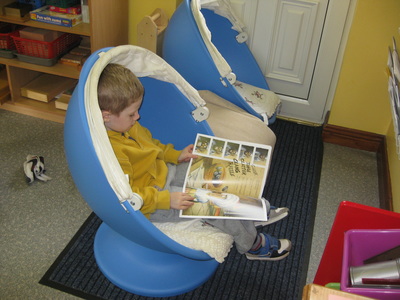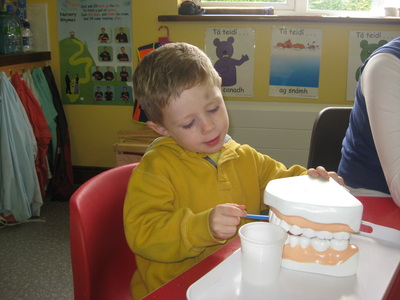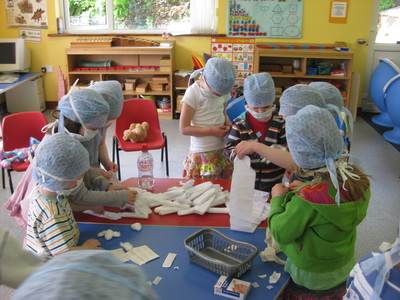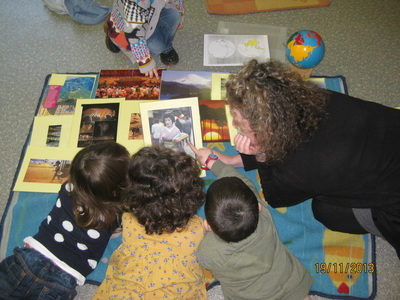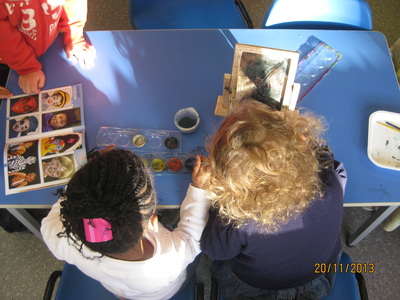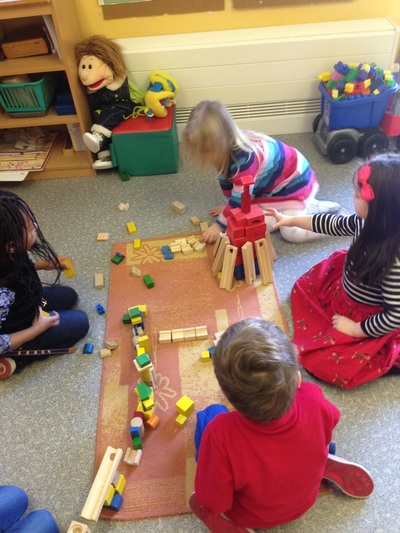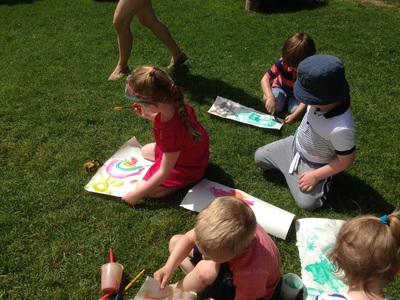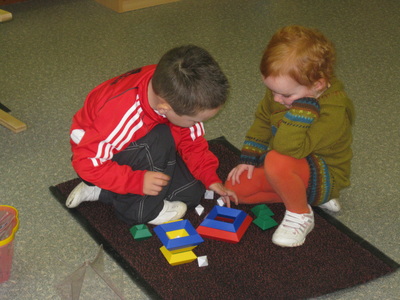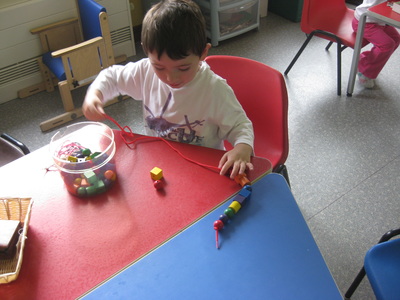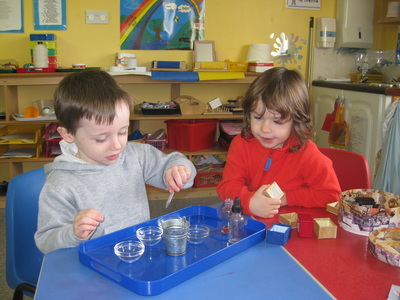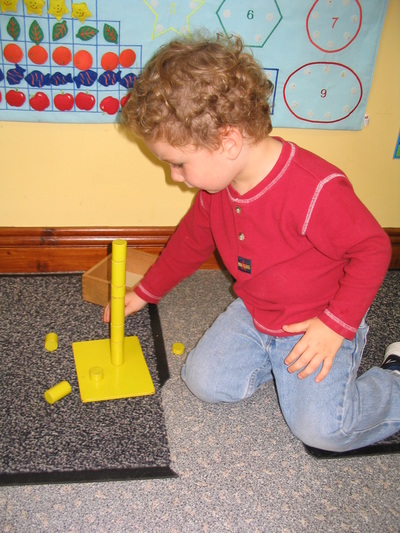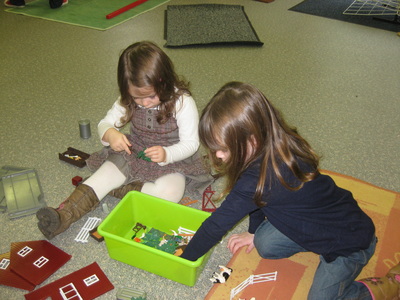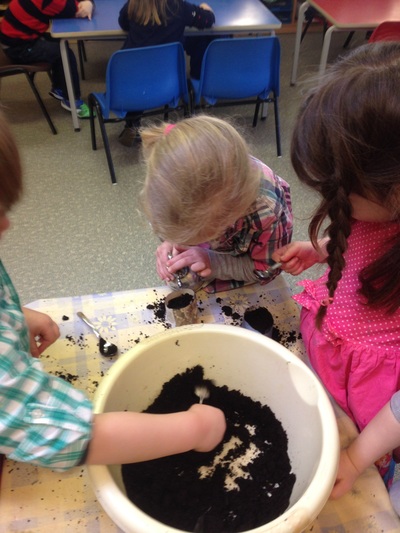Montessori Method at Scoil na n-Óg
What is Montessori Teaching?
Montessori is a method of education that is based on self-directed activity, hands-on learning and collaborative play. The Montessori Method aims to assist in the total development of the child-Socially, Emotionally, Physically, and Culturally. The first six years of a child’s life are extremely important to the child’s development. This is what Montessori described as the absorbent mind (the child’s mind basically absorbs everything put in his/her pathway). Children make creative choices in their learning while the classroom and the teachers offer age appropriate activities and learning experiences to guide the learning process. In a Montessori School, the child will develop a love of learning that will stay with him/her for the rest of his/her life.
Montessori is a method of education that is based on self-directed activity, hands-on learning and collaborative play. The Montessori Method aims to assist in the total development of the child-Socially, Emotionally, Physically, and Culturally. The first six years of a child’s life are extremely important to the child’s development. This is what Montessori described as the absorbent mind (the child’s mind basically absorbs everything put in his/her pathway). Children make creative choices in their learning while the classroom and the teachers offer age appropriate activities and learning experiences to guide the learning process. In a Montessori School, the child will develop a love of learning that will stay with him/her for the rest of his/her life.

What the Montessori Method offers your child.
- Freedom of choice within a positive, structured and non-competitive atmosphere and environment.
- The opportunity to work, play and learn at his/her own pace. Children are not judged or compared to each other, are free to like each other, and learn to appreciate the accomplishments of their classmates, and to co-operate with each other's educational experiences.
- Education of the senses: Visual, Tactile, Auditory, Olfactory, Gustatory, Chromatic, Baric, Thermic and Stereognostic senses.
- The concentration of the child is developed through a series of stimulating activities which have been specifically created to meet his/her needs.
- The opportunity for social interaction. Each class becomes a neighbourly, cooperative community.
- An environment which allows the child to acquire the skills necessary for independence.
- The structure of the classroom combined with the freedom offered to the child promotes the growth of self-discipline.
- Children with special interests and/or abilities can forge ahead as far and as fast as they want without being held back by fixed, formal curriculum.

The Teacher.
Dr. Montessori said, “The first task of an educator must be to stimulate life and then leave it free to develop and unfold.”
A Montessori teacher is a connecting link between the children and the Montessori materials. Since the desire to learn is in children, the adult does not have to create the desire. She simply acts as a catalyst and a facilitator.
His/her job is to encourage, preserve, and advance each child’s innate curiosity about the world. A keen observer of individual needs, s/he knows when to step in and when to step back from a child’s exploration. In our Montessori school, each child has a key worker that follows the child’s progress and development for the duration of the school year. This affords the teacher great knowledge of the children’s strengths, interests and learning styles. Together, the teacher and child plan activities that facilitate the uniqueness of each child’s learning experience.
Dr. Montessori said, “The first task of an educator must be to stimulate life and then leave it free to develop and unfold.”
A Montessori teacher is a connecting link between the children and the Montessori materials. Since the desire to learn is in children, the adult does not have to create the desire. She simply acts as a catalyst and a facilitator.
His/her job is to encourage, preserve, and advance each child’s innate curiosity about the world. A keen observer of individual needs, s/he knows when to step in and when to step back from a child’s exploration. In our Montessori school, each child has a key worker that follows the child’s progress and development for the duration of the school year. This affords the teacher great knowledge of the children’s strengths, interests and learning styles. Together, the teacher and child plan activities that facilitate the uniqueness of each child’s learning experience.
Frequently Asked Questions.
|
How can I prepare my child for starting Pre-school?
Firstly visit the school on your own. It might seem like a good idea to include your child but visits to several schools can be confusing and upsetting to small children and you will be better able to concentrate and observe alone. When you have made a shortlist of possible schools, then visit together and talk about what you saw together in a relaxed way afterwards. Whenever the subject of school comes up, chat about the children you saw, what they were doing, where they went to play and when they had their snack. A child who understands the structure/routine of a morning at school is much better equipped than a child thrown in at the deep end.
Dress the child in easy comfortable clothes (tracksuits, leggings, t-shirts) which are easy for them to manage and discuss and show the child what is in their lunch bag. My child is really so attached to her/his grubby old piece of blanket,I am sure he will want to take it to school. Should I try to wean him off it now s/he is growing up?
Growing up happens gradually and won’t happen on the first day that a child is separated from a parent/guardian for whole mornings. Suggest putting the blanket in their bag and ask your child to choose a favourite cuddly toy and book to go along with it. S/he will feel they are being allowed to exercise control over their new situation and that precious links between school and home are permissible and encouraged. One day, they will decide to leave the blanket/ teddy…. at home because it gets in the way!
My son/daughter was so excited about their new school and sailed in on the first few mornings. Now it’s Monday and s/he refuses point blank to go. S/he says s/he’s “tired of it.”
Your child may be just tired rather than ‘tired of school’. However well a child is prepared for what goes on in pre-school, the sheer amount of time it takes can come as a surprise. New routines can be exhausting. It’s probably best not to bombard them with questions about school when they come home; let them sleep, or just flop around and relax for a bit. Maybe asking questions about specific activities you know happened on a particular day may help your child relate to you the activities of their day eg. Painting/Outside/Music/ Games…If Mondays are particularly hard, maybe choosing something from the day before to bring to school may help eg. Flower/Leaf from the garden for the nature table, a photograph to stick in their special book or a story book that they can share and read with friends.
My child is very shy with strangers and I worry that s/he won’t ask if they need something at school. S/he is toilet trained at home but sometimes has accidents in other people’s houses.
Give your child plenty of time to get to know their surroundings, maybe with extra visits before s/he starts school. On the first day perhaps you and your child go together and ask the teacher where the bathrooms are and go there together noting any landmarks along the way eg. Bathroom is beside the cloakroom. Share your concern with the teacher and tell him/her and your child that there are extra clothes in the bag in case they are needed. Having their own clothes to put on is reassuring. And Please remember that Early ED. teachers are very experienced and have the skills to comfort and reassure a child who is feeling anxious.
I stayed with my child the first few days and gradually took my leave but s/he still screams the place down when I go. S/he is fine once I have gone but it makes me upset to leave him/her in such a state and we are both apprehensive when we get ready in the mornings.
Many children find the moment of parting hardest to bear. Try to avoid the build up of tension by chatting on the way to school about the dull things you will be doing while they are at preschool (exaggerate the dreariness!!),the nice lunch/dinner you will make together when school is over and how you will both spend your evening at home. Talk about things that your child enjoys doing at preschool and ask them what they would like to do first when they get there. Make sure these ideas are passed on to the teacher so s/he can get your child started swiftly. Try not to be afraid to talk about his/her tears and fears as this reassures children that these feelings are ‘OK’ and we all experience them.
Can I stay with my child during the first week of school while s/he gets used to pre-school?
Many schools differ on this therefore it’s best to discuss this prior to your child starting. Our school offers open evenings prior to the beginning of the school year and these are opportunities for parents to stay with their child in the preschool. If your child starts mid-year, we facilitate a parent/guardian to stay for a little while if they so wish and an agreed time frame will be discussed between the teacher and parent. When your child starts pre-school, the AIM is to settle children into an environment which will not include parents or guardians so you may be asked to sit in an adjoining room or even outside in a car, while your child gets used to the idea that you are close at hand for the time being but only if needed.
|

